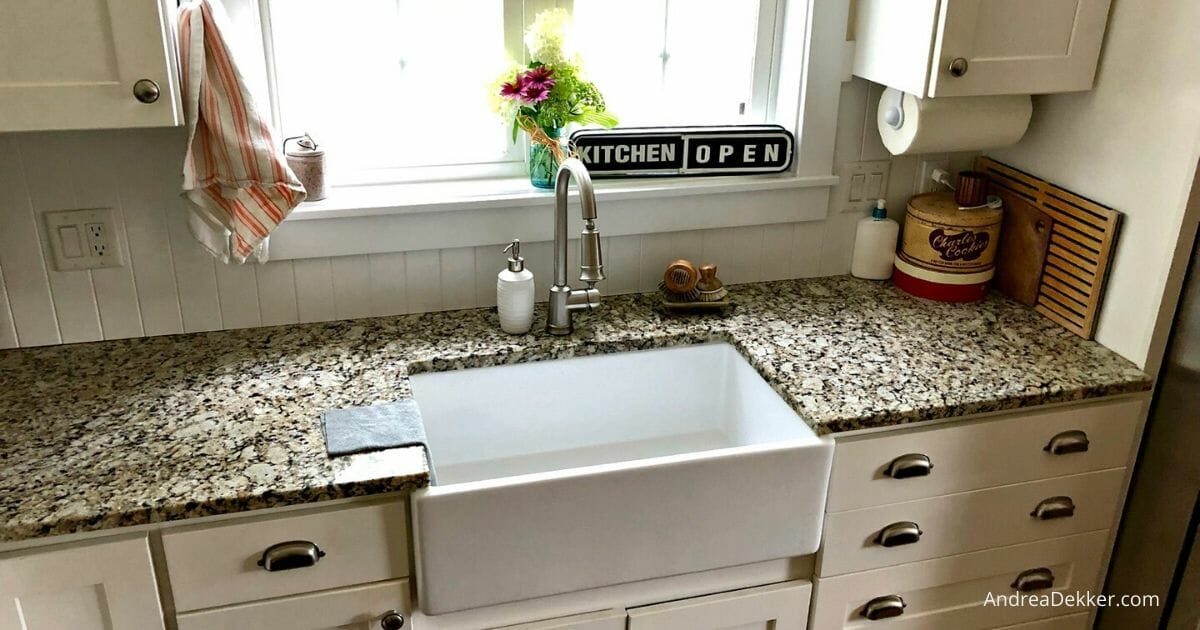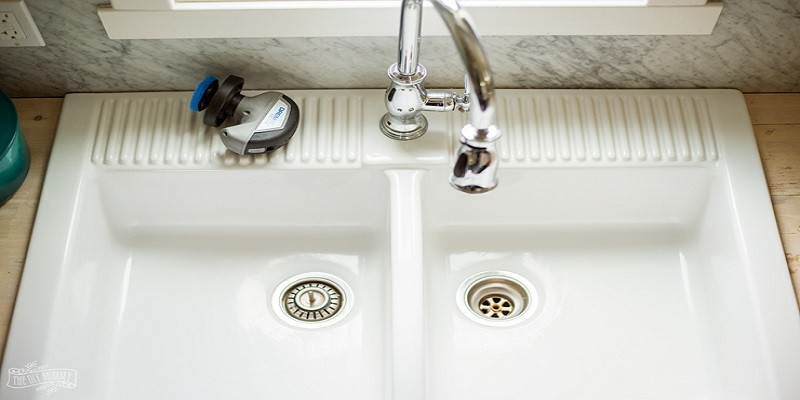Last Updated on October 18, 2023
Cleaning a farmhouse sink involves using a mixture of baking soda and vinegar followed by a thorough rinse. To clean your farmhouse sink effectively, use this simple method and enjoy a sparkling clean sink in no time.
Keeping a farmhouse sink clean is essential to maintain its beauty and functionality. However, with regular use, these sinks can accumulate stains, soap scum, and grime. Fortunately, cleaning a farmhouse sink is not a complex task. By following a straightforward method using common household ingredients, you can easily restore the sink’s shine and cleanliness.
We will guide you on how to clean a farmhouse sink effectively. From removing stubborn stains to tackling mineral deposits, we will provide you with step-by-step instructions to ensure your sink stays pristine. Follow these simple guidelines and enjoy a spotless farmhouse sink that enhances the overall aesthetics of your kitchen.

Credit: andreadekker.com
Preparing For The Cleaning Process
Whether you’re a farmhouse sink enthusiast or simply looking to give your kitchen a fresh new look, knowing how to properly clean your farmhouse sink is essential. From removing debris to prepping the sink for a deep clean, this guide will walk you through the step-by-step process.
In this section, we’ll focus on preparing for the cleaning process, ensuring you have everything you need to get the job done right.
Gathering The Necessary Supplies
To clean your farmhouse sink effectively, gather the following supplies:
- Non-abrasive cleanser or mild dish soap: These gentle cleaning agents will help remove dirt and grime without damaging your sink’s finish.
- Soft sponge or cloth: Opt for a non-scratch sponge or microfiber cloth to prevent any potential scratches on the sink surface.
- Old toothbrush or small brush: This tool will come in handy for tackling hard-to-reach spots or crevices.
- Baking soda and vinegar (optional): If you prefer a natural cleaning solution, baking soda and vinegar can be used to create a paste that helps remove stains and odors.
- Rubber gloves: Protect your hands from any harsh chemicals or hot water during the cleaning process.
Removing Any Objects Or Debris From The Sink
Before you start cleaning, it’s important to remove any dishes, utensils, or other objects from the sink. This will allow you to have a clear workspace and ensure that you don’t accidentally damage any items during the cleaning process. Additionally, take a few moments to check for and remove any larger debris, such as food scraps or gunk, from the sink.
This will make the cleaning process more effective and prevent clogs in your sink’s drain.
Pre-Rinsing The Sink With Warm Water
Once the sink is clear of any items and debris, give it a thorough pre-rinse with warm water. This step helps loosen any surface dirt or grime, making the cleaning process easier. Use a gentle stream of warm water to rinse the entire sink, paying extra attention to the corners and edges.
This will help remove any loose particles or residue.
Now that you’ve gathered all the necessary supplies, removed any objects or debris, and pre-rinsed the sink, you’re ready to tackle the cleaning process. In the next section, we’ll delve into the various methods and techniques you can use to clean your farmhouse sink effectively.
Stay tuned!
Cleaning The Farmhouse Sink
To keep your farmhouse sink looking its best, regular cleaning is essential. Follow these steps for a thorough and effective clean:
Using A Non-Abrasive Cleaner Or Detergent:
- Choose a non-abrasive cleaner or detergent specifically designed for use on sinks.
- Avoid using harsh chemicals or abrasive cleaners as they can damage the surface of your sink.
- Opt for environmentally friendly cleaners if possible.
Applying The Cleaner To The Sink’S Surface:
- Saturate a soft sponge or cloth with the cleaner.
- Start by applying the cleaner to the sink’s surface, covering all areas.
- Allow the cleaner to sit for a few minutes to loosen up any dirt or grime.
Scrubbing The Sink With A Soft Sponge Or Brush:
- Gently scrub the sink using a soft sponge or brush.
- Pay extra attention to areas with stubborn stains or buildup.
- Avoid using excessive force to prevent scratching the sink’s surface.
Paying Attention To Hard-To-Reach Areas And Corners:
- Don’t forget to clean hard-to-reach areas and corners of the sink.
- Use a smaller brush or toothbrush to reach these tight spots.
- Take your time to ensure thorough cleaning in all areas.
Rinsing The Sink Thoroughly With Warm Water:
- Rinse the sink thoroughly with warm water to remove any cleaner residue.
- Make sure to rinse all surfaces, including the faucet and drain.
- Use a clean sponge or cloth to remove any remaining residue if needed.
Drying The Sink With A Clean Cloth Or Towel:
- Dry the sink completely using a clean cloth or towel.
- This will help prevent water spots and mineral deposits.
- Pay attention to any areas that tend to hold moisture, such as around the drain and faucet.
By following these simple steps, you can maintain the cleanliness and beauty of your farmhouse sink for years to come. Remember to clean your sink regularly to keep it looking its best and to prevent any buildup or stains.
Maintaining The Cleanliness Of The Sink
Regularly wiping and drying the sink after use:
- After each use, wipe the sink with a clean, damp cloth to remove any residue or food particles.
- Dry the sink thoroughly with a soft towel to prevent water spots and minimize the risk of stains.
- By keeping your sink consistently clean and dry, you can maintain its shine and prevent the buildup of dirt and grime.
Avoiding leaving standing water in the sink:
- Standing water can lead to the growth of bacteria and unpleasant odors.
- Make sure to empty the sink and remove any leftover water after each use.
- If you need to soak dishes or utensils, use a separate basin or a dish rack instead of leaving them in the sink for an extended period.
Using a sink protector or mat to prevent scratches:
- Placing a sink protector or mat at the bottom of your farmhouse sink can help protect it from scratches caused by pots, pans, and other kitchen utensils.
- Choose a non-slip and heat-resistant protector that fits the dimensions of your sink to ensure maximum coverage and effectiveness.
Addressing any stains or marks promptly:
- If you notice any stains or marks on your farmhouse sink, it is essential to address them promptly to prevent them from becoming more difficult to remove.
- Use a mild dish soap or a non-abrasive cleaner specifically designed for the material of your sink.
- Scrub gently with a soft sponge or cloth to avoid scratching the surface.
Preventing the buildup of limescale or mineral deposits:
- To prevent the formation of limescale or mineral deposits in your sink, it is crucial to clean it regularly.
- Use a mixture of equal parts water and vinegar to remove any existing buildup.
- Scrub gently with a sponge or cloth, and rinse thoroughly with water afterward.
Remember, by regularly wiping, drying, and addressing any stains promptly, you can keep your farmhouse sink clean and maintain its pristine appearance. Avoid leaving standing water, use a sink protector, and prevent the buildup of limescale to ensure its longevity.
With these simple steps, you can enjoy a clean and beautiful sink for years to come. Happy cleaning!
Frequently Asked Questions For How To Clean A Farmhouse Sink?
How Do I Clean A Farmhouse Sink Without Scratching It?
To clean a farmhouse sink without scratching, use mild dish soap, a soft sponge, and avoid abrasive cleaners or scrub brushes.
Can I Use Vinegar To Clean My Farmhouse Sink?
Yes, you can use vinegar to clean your farmhouse sink. Mix equal parts vinegar and water, apply to the sink, and scrub gently.
What’S The Best Way To Remove Stains From A Farmhouse Sink?
To remove stains from a farmhouse sink, make a paste of baking soda and water, apply to the stain, let it sit for a few minutes, then scrub gently.
How Often Should I Clean My Farmhouse Sink?
It is recommended to clean your farmhouse sink once a week to prevent buildup and maintain its appearance.
How Can I Prevent My Farmhouse Sink From Getting Stained?
To prevent your farmhouse sink from getting stained, avoid leaving food or liquids in the sink for extended periods, and if a spill occurs, clean it promptly.
Conclusion
Keeping your farmhouse sink clean is an essential part of maintaining its beauty and functionality. By following the steps outlined in this guide, you can easily remove stains, prevent scratches, and eliminate odors. Regularly cleaning your sink with gentle, non-abrasive cleaners will help maintain its shine and prevent buildup.
Additionally, incorporating daily maintenance habits such as drying the sink after use and avoiding harsh chemicals will prolong its lifespan. Remember to use soft brushes or sponges to prevent scratching the surface and always rinse the sink thoroughly to remove any residue.
Taking the time to care for your farmhouse sink will not only keep it looking its best, but also ensure that it remains a focal point in your kitchen for years to come. So go ahead, put these tips into practice and enjoy a clean and beautiful farmhouse sink!




